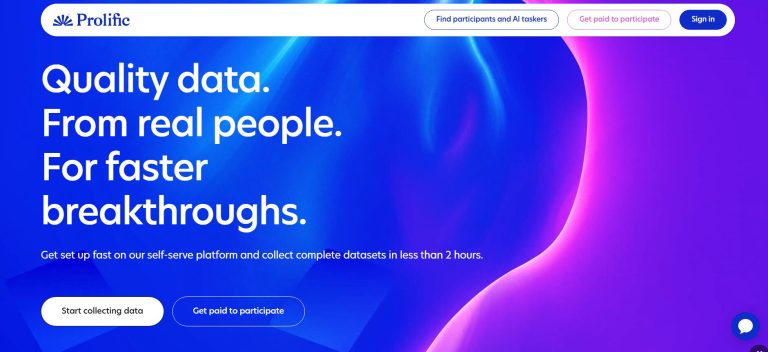Prolific
Prolific is a platform designed to facilitate high-quality human data collection at scale for researchers across AI, academia, and industry. It connects researchers with a diverse pool of vetted participants, enabling the collection of reliable human feedback for various studies, experiments, and AI model training and evaluation.
Key Features & Capabilities
- High-Quality Data Collection: Provides access to a large pool of active, vetted, and engaged participants, ensuring detailed, accurate, and honest responses for research and AI training.
- Fast Data Collection: Enables researchers to set up and launch studies quickly, often collecting complete datasets in minutes or hours, not days.
- Diverse Participant Pool: Offers extensive demographic screening and custom filters to help researchers find specific kinds of participants for their studies, ensuring diverse and targeted samples.
- AI Model Training & Evaluation: Supports the acceleration of AI development cycles by connecting AI/ML developers with “AI Taskers” and “Domain Experts” for human feedback on models.
- Seamless Tool Integration: Works with various existing survey, interview, and experiment tools by simply providing a link, or through its API for more complex integrations.
- Participant Vetting & Quality Assurance: Implements robust onboarding processes, including identity checks, and ongoing performance monitoring to maintain high data quality.
- Flexible Study Design: Allows for various study types, from simple surveys to complex, multi-part experiments and AI evaluation tasks.
- API-First Infrastructure: Provides a powerful API for integrating human feedback directly into workflows, enabling dynamic study creation and real-time analysis.
How to Use Prolific
Prolific serves two main user groups: researchers and participants.
For Researchers:
- Create a Researcher Account: Sign up on the Prolific platform as a researcher.
- Set Up a Study: Design your research study or AI task, defining your objectives, target audience, and compensation.
- Define Participant Criteria: Use Prolific’s pre-screeners and custom filters to select the specific demographics and characteristics of the participants you need.
- Launch Your Study: Publish your study to make it available to the Prolific participant pool.
- Monitor & Collect Data: Track the progress of your study and collect the data as participants complete tasks.
- Review Submissions: Approve or reject submissions based on quality and completeness, and download your annotated data.
For Participants:
- Create a Participant Account: Sign up and complete your profile, including demographic information, to be matched with relevant studies.
- Discover Studies: Browse available studies on your dashboard that match your profile and interests.
- Participate in Studies: Take part in surveys, experiments, or AI tasks.
- Earn Rewards: Get paid for your contributions, with fair rewards for your time and effort.
Common Use Cases for Prolific
- Academic Research: Conduct psychological, social science, behavioral, and other academic studies with diverse and reliable human data.
- AI/ML Model Training & Evaluation: Collect human-generated datasets, perform reinforcement learning from human feedback (RLHF), and evaluate the performance of AI and machine learning models.
- Market Research & Surveys: Gather opinions, preferences, and feedback from target consumer groups for product development, brand perception, and market analysis.
- User Experience (UX) Testing: Obtain insights into user behavior and usability for websites, applications, and prototypes.
- Data Annotation & Labeling: Acquire human annotations for images, text, audio, and video to train supervised learning systems.
- Human-in-the-Loop Systems: Integrate human intelligence into automated workflows for tasks that require nuanced understanding or subjective judgment.
Frequently Asked Questions (FAQ)
Q: What is Prolific?
A: Prolific is an online platform that connects researchers with human participants to collect high-quality data for academic studies and AI model training and evaluation.
Q: How does Prolific ensure data quality?
A: Prolific employs a multi-layered approach to quality assurance, including rigorous participant vetting, ongoing performance monitoring, and options for researchers to include attention and comprehension checks.
Q: Is Prolific suitable for both academic research and industry applications?
A: Yes, Prolific is widely used by both academic researchers for scientific studies and by industry professionals for AI development, market research, and UX testing.
Q: How quickly can I collect data using Prolific?
A: Prolific is designed for speed, allowing researchers to set up and launch studies quickly, often collecting complete datasets within hours.
Q: Can I target specific demographics with Prolific?
A: Yes, Prolific offers extensive demographic screening and filtering capabilities, enabling researchers to recruit highly specific participant groups for their studies.
Q: Does Prolific help with training AI models?
A: Yes, Prolific supports AI development by providing human feedback for training, evaluating, and refining AI and machine learning models through specialized tasks.
Q: How does Prolific compensate participants?
A: Prolific ensures participants are paid fairly for their time and contributions, with rewards often exceeding minimum wage equivalents, and payments typically processed quickly.
Q: What kind of support does Prolific offer?
A: Prolific provides comprehensive support through a dedicated help center for both researchers and participants, including articles, tutorials, and customer support.
Explore and learn about File extensions
No results available
ResetReviews
Prolific has received 0 reviews with an average rating of out of 5
Prolific Website Information
- Category: AI, Business Research, Others
- Platform: Website
- License Type: Website
- Published: July 13, 2025
- Website: Prolific
Alternative to Prolific
There are no similar listings
Reset




